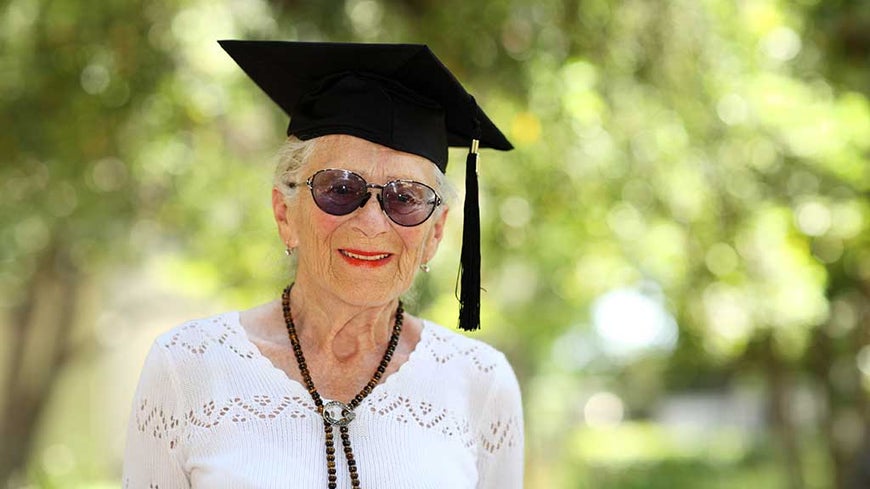Lifelong learning for seniors

Learning is a key aspect of one’s social and economic development, which is why the concept of ‘lifelong learning’ has become increasingly important in Australia. According to the Australian Bureau of Statistics, over the last 5 years, people over the age of 50 were still highly active in both formal and non-formal learning activities.1
As you get older, learning is a great way to stay active, find meaningful employment, and even boost your chances of a satisfying retirement. It will also allow you to view challenges as opportunities for growth while you’re surround by other confident people who keep you inspired.
Neuroscience and psychology show that our brains remain malleable even as we get older, so whether you’re 18 or 81, it’s always a good time to keep learning.2
What is lifelong learning?
‘Lifelong learning’ simply refers to the continuation of learning as you get older. This can be through formal education or even non-formal activities you undertake yourself, such as DIY courses and self-help books.
Lifelong learning is now recognised by educators, governing bodies, accreditation organisations, certification boards, employers, third-party payers, and the general public as one of the most important competencies a person can possess.
Lifelong learning generally falls into two categories:
Learning for personal development
Learning can be practised at any age and can be extremely rewarding.
Research shows that continuous learning and having an active mind could delay progress of some forms of dementia while also improving memory and self-confidence.For baby boomers preparing for retirement, lifelong learning is an obvious way to fight off mental and physical stress that may get in the way.
Lifelong learning expert, Nancy Merz Nordstrom, describes learning as a vital ingredient for anyone in their “after-50” years, with ten main benefits:3
1. An enriched life of self-fulfilment
Our capacity to learn and grow does not decrease with age. It’s never too late to start learning and through academic learning comes greater fulfilment and an exciting multi-dimensional life.
2. Valuable relationships
Through lifelong learning, adults are meeting new people, forging friendships and relationships with others, as well as enjoying an active social life. Lifelong learning is a great way to keep in touch with people and live a life surrounded by the company of adults truly embracing the excitement of the later years.
3. A sense of worth
Practising lifelong learning allows for meaningful community involvement and gives you a sense that you are an incredible asset. By taking part in educational programs and by enjoying an active social life, retirement is suddenly a whole lot more enjoyable.
4. Provides meaning
Lifelong learning allows you the benefit of real perspective and enables you to find true meaning in the hills and valleys of your past. Through learning, looking back is made enjoyable.
5. Greater adaptability
Continuing to learn throughout your senior years will also allow you to keep up with society’s changes – especially when it comes to adapting to fast-paced technological changes.
Research has shown that Australians 75 years or older are clocking up close to 20 hours per week on average online, meaning that many seniors are embracing the Internet for activities.4
6. Makes the world a better place
Through the community aspect of lifelong learning, older adults can give back to their local community and to the world. Learning offers opportunity to share your wisdom and valuable insight as an older adult with a wealth of experience.
7. Increases wisdom
Greater knowledge is an obvious part of lifelong learning, but what might not be so obvious is the effect lifelong learning can have on your inner wisdom. Learning helps you to better understand your successes and failures and can help you better understand yourself.
8. Increased drive
Learning gives you the hunger for life that is so often missing in your later years. The more you learn, the more there is discover about the world and that hunger constantly fuels your mind into action. Drive and desire created in the classroom pushes you into further exploration.
9. An open mind
An integral part of lifelong learning is the free exchange of ideas and viewpoints among older learners. Listening or taking part in a stimulating conversation helps open your mind to other possibilities.
10. Develop abilities
Having moved on from working life, you are now free to truly explore yourself and your innate natural abilities. We’re all born with abilities, but unfortunately, life’s responsibilities often gets in the way of us exploring them. By learning during retirement, we have ample opportunity to develop abilities that may have sat dormant.
Learning for professional development
While qualifications can help you get a job, continued learning is the key to making that job secure. Learning throughout your career is a great way to ensure job security and find new opportunities as well.
While you are employed, take advantage of any training, coaching or mentoring initiatives at your organisation. If staying in employment for as long as possible is your goal, lifelong learning is one way you can help make your goal a reality.
Tips for lifelong learning
Lifelong learning doesn’t have to be complicated and can be achieved on your own without the need to return to formal education. Lifelong learning can be about simple things you do at home to stay aware and gain more knowledge.
Tips for installing the habit of lifelong learning include:
- Always read a book
- Keep a ‘to learn’ list
- Practice guided thinking
- Teach others
- Take it slow
- Start learning as soon as possible.
With some simple inclusions in your daily routine, you can find yourself learning new skills that can become a valuable resource at any stage in life. Find out how Australian Seniors can help you stay protected no matter what endeavours you’re planning to take in life.
4 Oct 2016